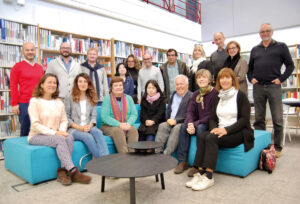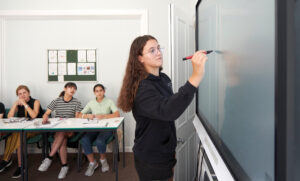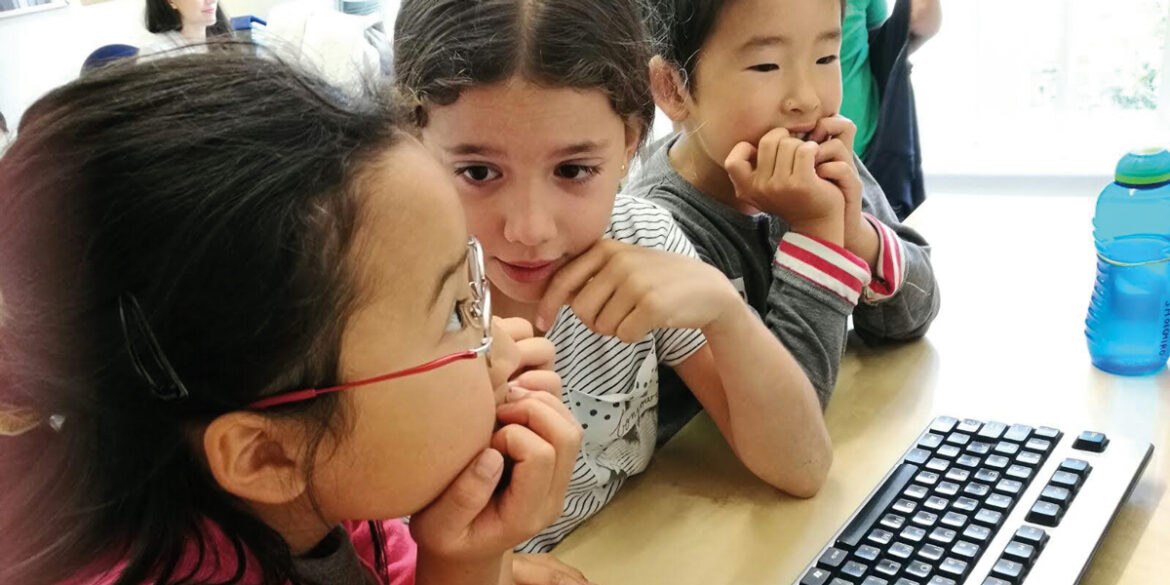Find out why Cambridge has been named the number one place in the UK for learning and retaining a second language – and discover the city’s top linguistic locales!
The next time you’re walking through Cambridge, take a moment to tune into the many languages being spoken around you; chances are, you will hear at least one that isn’t English. In fact, a recent study by Preply has revealed that Cambridge is the UK’s top cultural hotspot of 2022, with 18% of its residents speaking more than one of 12 foreign languages analysed in the study – including Mandarin, Spanish, Italian and Portuguese. This study even goes so far as to say that Cambridge is the top UK city for learning and retaining a second language.
If you are itching to refresh your linguistic skills or keen to learn something new, then you will find a wealth of options at your fingertips right here in Cambridge. Take La Dante, for instance: starting out as an Italian culture centre in 2010, it has evolved over 12 years to become a fully fledged European centre promoting Italian, Spanish and English language and culture. The latter is a core component in the teaching, according to its founder, Giulia Portuese-Williams.
“Grammar is only taught within the context of the culture,” she explains. “We also try to teach languages with a 360° approach; not only do students learn the language, they are also exposed to Radio Dante podcasts, they attend monthly meet-ups and they can take part in free cooking classes in the language they’re studying! Normally, people go to a class, and then afterwards don’t know exactly where to go to practise or engage with the community. We definitely make a difference in that respect.”
 Find Teaching via culture is also central to the approach taken by the Cambridge Chinese Community Centre, which offers Mandarin classes to adult learners. Sessions are taught by Professor Niu from Shandong University of Arts and visiting scholar at the Faculty of Modern and Medieval Languages at Cambridge University. “For most people learning a new language, the very beginning is the hardest part,” she says. “Our Chinese for Beginners class aims to make the journey easier and fun. We teach practical Chinese conversation as well as Chinese characters, while telling related stories. This allows learners to experience the charm of Chinese language and culture during their learning journey.”
Find Teaching via culture is also central to the approach taken by the Cambridge Chinese Community Centre, which offers Mandarin classes to adult learners. Sessions are taught by Professor Niu from Shandong University of Arts and visiting scholar at the Faculty of Modern and Medieval Languages at Cambridge University. “For most people learning a new language, the very beginning is the hardest part,” she says. “Our Chinese for Beginners class aims to make the journey easier and fun. We teach practical Chinese conversation as well as Chinese characters, while telling related stories. This allows learners to experience the charm of Chinese language and culture during their learning journey.”
Alliance Française is also a key player in promoting second languages in Cambridge. Established 40 years ago, the charity offers classes in both French and Spanish for adults and children. It currently teaches around 120 children aged between four and 18, who attend classes on Saturdays, while adults constitute at least another 120 of its learners. Many are studying French for work, with specialist classes that can focus on professional areas such as business, marketing and development. Others are attracted to the social aspect: every Wednesday a conversation class called Café Français is held between 11.30am and 12.45pm. Some people have met their partners while studying at Alliance Française – and there are even a couple of Alliance Française babies in the mix!
For director Patricia Dalby, the benefits of learning a language cannot be emphasised enough. “As a person who speaks English, French and Spanish, I believe that speaking different languages opens doors for you. It’s like borders don’t exist – you feel you can travel without fear and understand your surroundings,” she comments. “It’s also great for self-esteem. It’s about obtaining a skill that not all people have, and the opportunities that presents you with.”
Patricia is also an ardent advocate of lifelong learning more generally: “Personally, I think everyone should constantly learn,” she affirms. “It doesn’t matter whether it’s a language, the guitar or football, it should be part of your life to learn all the time!”
For those seeking a taste of Cambridge’s academic side, then the Cambridge University Language Programme (CULP) is the place to look. Founded in 2000 as a university-wide language programme for non-specialist learners, CULP teaches a total of 18 languages – including recent additions Latin and Ancient Greek.
Historically, classes have always been taught in a blended mode, with face-to-face teaching plus a bank of online resources for self-study between classes – a structure that enabled a smooth transition to online learning during the pandemic. Now, 60% of the teaching is face-to-face, while 40% is remote. This offers greater flexibility for students, such as medics on placement – and has helped make the courses more accessible to the public.
According to the director Nebojša Radić, participation by external students (members of the public) is an enormous asset to CULP’s classes. “On average, members of the public are older than our students, so they have more world knowledge, they’re well-travelled and bring with them quite a bit of life experience – it makes classes more interesting,” he says.
 Quizzed on why it might be that Cambridge ranks so highly for learning languages, Nebojša points to the strong international community. “Firstly, we have the university, where over 60% of post-graduate students are already international, in addition to a very multicultural body of lecturers,” he explains. “Then we have the Business Park and Science Park, which are very diverse again.”
Quizzed on why it might be that Cambridge ranks so highly for learning languages, Nebojša points to the strong international community. “Firstly, we have the university, where over 60% of post-graduate students are already international, in addition to a very multicultural body of lecturers,” he explains. “Then we have the Business Park and Science Park, which are very diverse again.”
Cambridge also holds great appeal for overseas students looking to improve their English, with well over a dozen English schools in the city. For the Cambridge Centre for Languages, Easter and summer are the busiest times of year, when they host in-person language courses at St Mary’s School, typically welcoming over 300 students from all over the world. They even offer courses linked to particular skills or interests, such as coding or drama.
For the students on these courses, the appeal of Cambridge lies in its reputation for educational excellence. “Cambridge is an internationally recognised centre of learning, full of culture and with a historic, scholarly legacy that inspires young learners. That’s a big motivation to come here,” says managing director Laura Chen. “As a city, it’s also very green, vibrant and relatively safe – making it a great place for students of a wide range of ages to come here and study.”
“Cambridge is a wonderful place,” adds course director James Berkley. “It’s small, but it’s also full of activities and colourful cultures from every corner of the world. That’s why if you come to learn Chinese, French, Italian, Russian, whatever – you will find people here to practise with.”
At St Giles International, many of the students who come to Cambridge are looking to expand their professional horizons. “The average age of our students is around 22-23 years old, and what we find is that many of our students will come before, during or just after university,” says Andy Gaskins, acting principal. “It’s very much about work for them – English is a global language and the language of the workplace, so what you find is that a lot of students will finish university and then need to improve their English to get a job.”
However, it’s not just about learning the language. Students who come to study English in Cambridge also want to learn about British culture, meet new people and experience what it’s like to live in a multicultural society. Many foreign students choose to stay in homestays during their course, which involves living with a local family who will often provide breakfast and dinner for them, offering advice on things to see and do. For host families, this also offers the unique experience of getting to meet people from a range of countries and cultural backgrounds – and put any language skills they have been working on to good use.
Whatever the motivation, picking up a language or engaging with Cambridge’s international community is bound to spark interests and rewarding relationships, while fuelling a passion for lifelong learning. This January, why not challenge yourself to learn a new language or refresh ones you already know? You can rest assured that you’re in the right place for it!
Top Five Language Hotspots
Cambridge University Language Programme
Intensive courses that promise to push you – take your pick from 18 languages, including Arabic, British Sign Language, Hebrew, Korean, Portuguese and Swahili. The next round begins in April. langcen.cam.ac.uk
Hills Road Adult Education Courses
Choose from a wide range of languages including Chinese, French, German, Greek, Italian, Japanese, Russian and Spanish (at a range of levels), plus beginner Turkish and Ukrainian. Find out more at hillsroad.ac.uk
Alliance Française
Alliance Française has been sharing the best of French language and francophone culture in Cambridge for 40 years. Sign up to a course online and polish up! alliance-cam.co.uk
Cambridge Chinese Community Centre
Learn about one of the richest and oldest cultures in the world. Classes take place at Chesterton Community College every Sunday during school term time, between 12 and 2pm. For enquiries, get in touch with Shia at edu@cambridgechinesecommunitycentre.co.uk
La Dante in Cambridge
Inspired by the Dante Alighieri Society, La Dante offers classes in Italian, Spanish and English and hosts regular cultural events. ladante-in-cambridge.org

